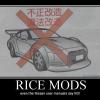Running On 5 Cylinders
Announcements
-
Similar Content
-
Latest Posts
-
By TurboTapin · Posted
I live in a French European province, within a very metric country. We hate football here and the statue of liberty was actually built in France haha. Sadly, we're currently also feuding hard with the US due to tariffs. The US is the US. Everywhere else, is everywhere else. -
Heater wasn’t working in my 32 so I decided to pull my dash out ( sounded like a great idea at the time) so initially I was sure the heater core was blocked. When I pulled it out turns out that the heater blower actuator was cable tied so it stayed shut and this prevented the heater core from doing its job as well as flowing. so currently the dash is out the heater core is out and seems to be fine but I think I’m in over my head and need someone that knows what they are doing to take over and get it finished. I’m located in mt Annan, nsw 2567 if anyone has any ideas or suggestions please let me know
-
ouch! how is the car now?I had sold my gtr but have been looking into some on trademe and a 260RS but I wouldnt be keen on any repairs needed on them
-







Recommended Posts
Create an account or sign in to comment
You need to be a member in order to leave a comment
Create an account
Sign up for a new account in our community. It's easy!
Register a new accountSign in
Already have an account? Sign in here.
Sign In Now